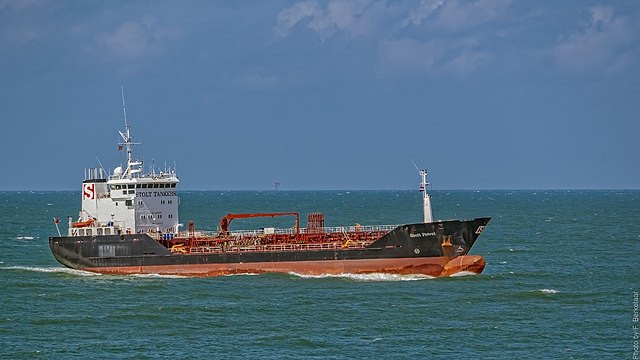A fire continues to burn aboard two vessels in the North Sea following a collision between a Portuguese-flagged cargo ship and a U.S.-bound oil tanker carrying aviation fuel for the U.S. military. The incident, which occurred Monday morning off the eastern coast of England, has prompted an international investigation involving the United States, Portugal, and the United Kingdom.
The Stena Immaculate, a U.S. chemical tanker loaded with approximately 35 million liters of jet fuel, was struck by the Solong, a Portuguese cargo ship that was reportedly carrying empty containers previously used to store sodium cyanide. The crash ignited both ships, forcing a mass evacuation and triggering concerns over environmental and security risks.
British minister Matthew Pennycook stated that the situation remains "fast-moving and dynamic" as emergency crews work to contain the fire. "Investigations are underway to determine the cause of the collision, led by U.S. and Portuguese authorities with assistance from U.K. agencies," Pennycook said Tuesday morning. He added, "We will get to the bottom of why this incident happened."
Authorities have not ruled out foul play, as questions emerge over why the Solong did not slow down or alter course before striking the Stena Immaculate. A White House official declined to speculate on potential sabotage but confirmed that U.S. Coast Guard investigators were en route to the U.K.
Concerns Over Environmental and Health Impact
The collision has raised alarms over possible fuel leaks, with experts warning that Jet A-1 aviation fuel has a higher toxicity than crude oil. "The impact of that on life in the oceans would be devastating," said Dr. Simon Boxall, an oceanography expert at the University of Southampton. British authorities are monitoring pollution levels, but Pennycook assured that "air quality remains within safe limits."
The potential presence of sodium cyanide has compounded fears. While Ernst Russ AG, the German owners of the Solong, stated that the ship's sodium cyanide containers were empty at the time of impact, British lawmaker Melanie Onn said that officials have yet to verify the claim. "[If] it gets into contact with water, it becomes airborne and is extremely dangerous," Onn told reporters.
Eyewitness Accounts Raise Questions About Cause of Crash
A U.S. sailor aboard the Stena Immaculate told CBS News that the Solong "came out of the blue" and collided with the tanker with little warning. The impact left only seconds for the crew to react before flames erupted. "It was a textbook evacuation," the sailor said, adding that some crew members suffered minor burns.
Maritime experts suggest human error may have played a role. Dr. Seyedvahid Vakili, a specialist at the University of Southampton, noted that fatigue and high workloads on cargo ships are common contributors to accidents. "At this stage it needs further comprehensive investigatio," he said.
The missing crew member from the Solong remains unaccounted for, with search efforts called off Monday night. All 23 crew members aboard the Stena Immaculate have been safely evacuated.
The U.S. Coast Guard confirmed it has deployed investigators to assist with the probe, working alongside the U.K.'s Marine Accident Investigation Branch and Portugal's Marine Safety Investigation Authority. A spokesperson stated, "Our team is actively engaged with all local authorities, and we will work with clean-up teams to mitigate further impacts on the marine environment."






